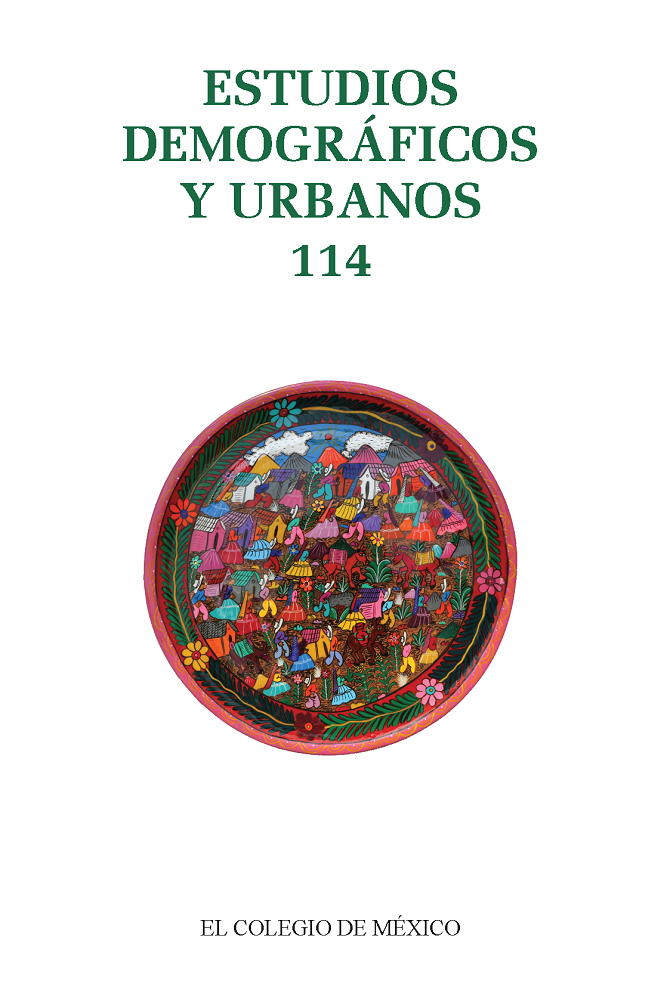Publicado 2023-09-19
Palabras clave
- estudiantización,
- desarrollo urbano,
- COVID-19,
- capital social
Cómo citar
-
Resumen462
-
PDF515
-
En línea30
-
EPUB16
-
Kindle30
-
Audio121
Descargas
Derechos de autor 2022 Estudios Demográficos y Urbanos

Esta obra está bajo una licencia internacional Creative Commons Atribución-NoComercial-SinDerivadas 4.0.
Métrica
Resumen
La estudiantización es un fenómeno socioterritorial cuyas consecuencias pueden dinamizar la estructura, las relaciones sociales y el desarrollo de algunos sectores de las ciudades, aunque también pueden generar efectos adversos. En el caso de Temuco, ciudad intermedia del sur de Chile, la llegada de estudiantes ha producido una mayor oferta de servicios universitarios, materializándose cambios tanto en el desarrollo urbano, como en el capital social y en las relaciones comunitarias existentes. Sin embargo, con el inicio de la pandemia del COVID-19 dichas dinámicas se han visto modificadas, generando efectos sobre la distribución estudiantil y sus relaciones sociales, pero se desconocen los alcances reales de éstos. La presente investigación, a partir de una metodología mixta que incluye encuestas, análisis espacial mediante la utilización de datos primarios y secundarios, y entrevistas en profundidad, se interroga sobre los efectos socioterritoriales de la estudiantización en Temuco y sus dinámicas como consecuencia del COVID-19.
Referencias
- Ackerman, A. y Visser, G. (2016). Studentification in Bloemfontein, South Africa. Bulletin of Geography. Socio-economic Series, 31, 7-17. https://scholar.sun.ac.za/server/api/core/bitstreams/f4127e9b-2faf-4e15-8cd3-e293125c30cf/content DOI: https://doi.org/10.1515/bog-2016-0001
- Álamos, F. (2019). Gran consolidación muestra el mercado de departamentos en Temuco. Diario El Mercurio, 22 de diciembre.
- Al-Dwaikat, T. N., Aldalaykeh, M. y Rababa, M. (2020). The relationship between social networking sites usage and psychological distress among undergraduate students during COVID-19 lockdown. Heliyon, 6(12). https://doi.org/10.1016/j.heliyon.2020.e05695 DOI: https://doi.org/10.1016/j.heliyon.2020.e05695
- Allinson, J. (2006). Over-educated, over-exuberant and over here? The impact of students on cities. Planning Practice & Research, 21(1), 79-94. https://www.tandfonline.com/doi/abs/10.1080/02697450600901541 DOI: https://doi.org/10.1080/02697450600901541
- Boersma, K., Langen, H. y Smets, P. (2013). Paradoxes of studentification: Social mix versus gentrification in a disadvantaged neighborhood in Amsterdam East. The Open Urban Studies Journal, 6(1), 40-49. https://benthamopen.com/contents/pdf/TOUSJ/TOUSJ-6-40.pdf DOI: https://doi.org/10.2174/1874942901306010040
- Consejo Nacional de Educación. (CNED) (2021). Índices de educación superior. https://www.cned.cl/indices-educacion-superior
- Duke-Williams, O. (2009). The geographies of student migration in the UK. Environment and Planning A, 41, 1.826-1.848. https://journals.sagepub.com/doi/10.1068/a4198 DOI: https://doi.org/10.1068/a4198
- Ehlenz, M. (2019). The university and its neighborhood: A study of place-making and change. Journal of Urban Affairs, 41(6), 776-794. https://www.tandfonline.com/doi/abs/10.1080/07352166.2018.1530568?journalCode=ujua20 DOI: https://doi.org/10.1080/07352166.2018.1530568
- Fairlie, R. y Fossen, F. M. (2021). The early impacts of the COVID-19 pandemic on business sales. Small Business Economics, 58, 1853-1864. https://doi.org/10.1007/s11187-021-00479-4 DOI: https://doi.org/10.1007/s11187-021-00479-4
- Garmendia, M., Coronado, J. M. y Ureña, J. M. (2012). University students sharing flats: When studentification becomes vertical. Urban Studies, 49(12), 2651-2668. https://journals.sagepub.com/doi/10.1177/0042098011428176 DOI: https://doi.org/10.1177/0042098011428176
- Grabkowska, M. y Frankowski, J. (2016). “Close to the city centre, close to the university”. Are there symptoms of studentification in Gdańsk, Poland? Bulletin of Geography. Socio-Economic Series, 32, 73-83. http://dx.doi.org/10.1515/bog-2016-0016 DOI: https://doi.org/10.1515/bog-2016-0016
- He, S. (2014). Consuming urban living in “villages in the city”: Studentification in Guangzhou, China. Urban Studies, 52(15), 2849-2873. https://journals.sagepub.com/doi/10.1177/0042098014543703 DOI: https://doi.org/10.1177/0042098014543703
- Holton, M. y Riley, M. (2016). Student geographies and homemaking: Personal belonging(s) and identities. Social & Cultural Geography, 17(5), 623-645. https://www.tandfonline.com/doi/full/10.1080/14649365.2015.1126626 DOI: https://doi.org/10.1080/14649365.2015.1126626
- Hubbard, P. (2008). Regulating the social impacts of studentification: A Loughborough case study. Environment and Planning A, 40, 323-341. https://journals.sagepub.com/doi/10.1068/a396 DOI: https://doi.org/10.1068/a396
- IDE-Chile. (2021). Información territorial. Infraestructura de Datos Geoespaciales de Chile. https://www.ide.cl/
- Instituto Nacional de Estadística. (INE) (2017). Censo de Población y Vivienda, 2017. Santiago, Chile: Instituto Nacional de Estadística. https://redatam-ine.ine.cl/redbin/RpWebEngine.exe/Portal?BASE=CENSO_2017&lang=esp
- Instituto Nacional de Estadística. (INE) (2019). Síntesis de resultados Censo 2017. Región de La Araucanía. Santiago, Chile: https://regiones.ine.cl/araucania/inicio
- Kenyon, E. (1997). Seasonal sub-communities: The impact of student households on residential communities. The British Journal of Sociology, 48(2), 286-301. https://www.jstor.org/stable/591753?origin=crossref DOI: https://doi.org/10.2307/591753
- Kinton, C., Smith, D. P., Harrison, J. y Culora, A. (2018). New frontiers of studentification: The commodification of student housing as a driver of urban change. The Geographical Journal, 184(3), 242-254. https://rgs-ibg.onlinelibrary.wiley.com/doi/abs/10.1111/geoj.12263 DOI: https://doi.org/10.1111/geoj.12263
- MacIntyre, C. (2003). New models of student housing and their impact on local communities. Journal of Higher Education Policy and Management, 25(2), 109-118. https://www.tandfonline.com/doi/abs/10.1080/1360080032000122598 DOI: https://doi.org/10.1080/1360080032000122598
- Marchant, C., Frick, J. y Vergara, L. (2016). Urban growth trends in midsize Chilean cities: The case of Temuco. Urbe. Revista Brasileira de Gestão Urbana, 8(3), 375-389. https://doi.org/10.1590/2175-3369.008.003.AO07 DOI: https://doi.org/10.1590/2175-3369.008.003.AO07
- Ministerio de Obras Públicas. (MOP) (2018). Estudio básico “Análisis de brechas de infraestructura urbana MOP en ciudades, etapa I”. Temuco Padre Las Casas. Informe final. Dirección de Planeamiento.
- Ministerio de Vivienda y Urbanismo. (Minvu) (2022). Observatorio Urbano. Total de viviendas unidades y superficie según agrupamiento y comuna. Desde 2002 a 2020 (actualizado en marzo de 2022). Santiago, Chile: Ministerio de Vivienda y Urbanismo.
- Mulhearn, C. y Franco, M. (2018). If you build it, will they come? The boom in purpose-built student accommodation in central Liverpool: Destudentification, studentification and the future of the city. Local Economy, 33(5), 477-495. https://journals.sagepub.com/doi/10.1177/0269094218792740 DOI: https://doi.org/10.1177/0269094218792740
- Municipalidad de Temuco. (2009). Plan Regulador de Temuco. Memoria explicativa. Secretaría de Planificación. https://www.temuco.cl/municipio/informacion-de-interes/plan-regulador/
- Municipalidad de Temuco. (2020). Plan de Desarrollo Comunal, 2020-2024. Resumen ejecutivo. https://www.temuco.cl/wp-content/uploads/2022/04/RESUMEN-EJECUTIVO-PLADECO-TEMUCO-2020-2024-.pdf
- Munro, M., Turok, I. y Livingston, M. (2009). Students in cities: A preliminary analysis of their patterns and effects. Environment and Planning A, 41, 1805-1825. https://journals.sagepub.com/doi/10.1068/a41133 DOI: https://doi.org/10.1068/a41133
- Nakazawa, T. (2017). Expanding the scope of studentification studies. Geography Compass, 11(1), 1-13. https://onlinelibrary.wiley.com/doi/10.1111/gec3.12300 DOI: https://doi.org/10.1111/gec3.12300
- Ossa, M. y Pantoja, M. (2012). Análisis y propuesta de imagen ciudad de Temuco, Chile. (Tesis de Ingeniería Comercial, Universidad de Chile). http://repositorio.uchile.cl/bitstream/handle/2250/111978/TESIS%20Camila%20Ossa%20-%20Paulina%20Pantoja.pdf?sequence=3
- Pickren, G. (2012). Where can I build my student housing? The politics of studentification in Athens-Clarke County, Georgia. Southeastern Geographer, 52(2), 113-130. DOI: https://doi.org/10.1353/sgo.2012.0019
- Pillai, A. K., Vieta, M. A. y Sotomayor, L. (2021). University student housing as business proposition and entrepreneurial activity: The Canadian case. Housing Policy Debate, 1-24. https://www.tandfonline.com/doi/full/10.1080/10511482.2021.1883703 DOI: https://doi.org/10.1080/10511482.2021.1883703
- Prada-Trigo, J. (2019a). Understanding studentification dynamics in low-income neighbourhoods: Students as gentrifiers in Concepción (Chile). Urban Studies, 56(14), 2863-2879. https://journals.sagepub.com/doi/10.1177/0042098018807623 DOI: https://doi.org/10.1177/0042098018807623
- Prada-Trigo, J. (2019b). Estudiantes universitarios y su importancia en los cambios barriales: ¿hacia nuevos modelos de gentrificación en espacios periféricos? Boletín de la Asociación de Geógrafos Españoles, 80, 1-32. http://dx.doi.org/10.21138/bage.2683 DOI: https://doi.org/10.21138/bage.2683
- Prada-Trigo, J., Cornejo, C. y Quijada-Prado, P. (2020). Cambios barriales como consecuencia de la llegada de estudiantes universitarios en dos sectores de Concepción, Chile. Revista INVI, 35(99), 109-129. https://revistainvi.uchile.cl/index.php/INVI/article/view/63307/66836 DOI: https://doi.org/10.4067/S0718-83582020000200109
- Prada-Trigo, J., Aravena, N. y Barra-Vieira, P. (2021). Urban growth and indigenous land. Real estate strategies and urban dynamics in Temuco (Chile). Geografiska Annaler: Series B, Human Geography, 103(2), 133-151. https://www.tandfonline.com/doi/full/10.1080/04353684.2021.1921602 DOI: https://doi.org/10.1080/04353684.2021.1921602
- Rérat, P. (2019). The return of cities: The trajectory of Swiss cities from demographic loss to reurbanization. European Planning Studies, 27(2), 355-376. https://www.tandfonline.com/doi/full/10.1080/09654313.2018.1546832 DOI: https://doi.org/10.1080/09654313.2018.1546832
- Revington, N. y August, M. (2020). Making a market for itself: The emergent financialization of student housing in Canada. Environment and Planning A: Economy and Space, 52(5), 856-877. https://journals.sagepub.com/doi/10.1177/0308518X19884577 DOI: https://doi.org/10.1177/0308518X19884577
- Revington, N., Moos, M., Henry, J. y Haider, R. (2020). The urban dormitory: Planning, studentification, and the construction of an off-campus student housing market. International Planning Studies, 25(2), 189-205. https://www.tandfonline.com/doi/full/10.1080/13563475.2018.1552565 DOI: https://doi.org/10.1080/13563475.2018.1552565
- Rolnik, R., Andrade Guerreiro, I de, y Marín-Toro, A. (2021). El arriendo –formal e informal– como nueva frontera de la financiarización de la vivienda en América Latina. Revista INVI, 36(103), 19-53. https://doi.org/10.4067/S0718-83582021000300019 DOI: https://doi.org/10.4067/S0718-83582021000300019
- Russo, A. y Capel, L. (2007). Changing landscapes of student populations. From citadels of education to cartier Latins (and back?). The changing landscapes of student populations in European cities. Geography Compass, 1(5), 269-274. https://onlinelibrary.wiley.com/doi/10.1111/j.1749-8198.2009.00302.x DOI: https://doi.org/10.1111/j.1749-8198.2007.00056.x
- Sage, J., Smith, D. y Hubbard, P. (2012a). The diverse geographies of studentification: Living alongside people not like us. Housing Studies, 27(8), 1057-1078. https://www.tandfonline.com/doi/abs/10.1080/02673037.2012.728570 DOI: https://doi.org/10.1080/02673037.2012.728570
- Sage, J., Smith, D. y Hubbard, P. (2012b). The rapidity of studentification and population change: There goes the (student) hood. Population, Space and Place, 18(5), 597-613. https://onlinelibrary.wiley.com/doi/10.1002/psp.690 DOI: https://doi.org/10.1002/psp.690
- Sage, J., Smith, D. y Hubbard, P. (2013). New-build studentification: A panacea for balanced communities? Urban Studies, 50(13), 2623. https://journals.sagepub.com/doi/10.1177/0042098013477694 DOI: https://doi.org/10.1177/0042098013477694
- Sampieri, H. y Torres, C. (2018). Metodología de la investigación: las rutas cuantitativa, cualitativa y mixta. Ciudad de México: McGraw-Hill.
- Smith, D. y Holt, L. (2007). Studentification and “apprentice” gentrifiers within Britain’s provincial towns and cities: Extending the meaning of gentrification. Environment and Planning A, 39, 142-161. https://journals.sagepub.com/doi/10.1068/a38476 DOI: https://doi.org/10.1068/a38476
- Smith, D. y Hubbard, P. (2014). The segregation of educated youth and dynamic geographies of studentification. Area, 46(1), 92-100. https://rgs-ibg.onlinelibrary.wiley.com/doi/10.1111/area.12054 DOI: https://doi.org/10.1111/area.12054
- Smith, D., Sage, J. y Balsdon, S. (2014). The geographies of studentification: “Here, there and everywhere”? Geography, 99, 116-127. https://www.tandfonline.com/doi/abs/10.1080/00167487.2014.12094405 DOI: https://doi.org/10.1080/00167487.2014.12094405
- Smith, D. (2019). Studentification. En Wiley Blackwell Encyclopedia of Urban and Regional Studies. Chichester: John Wiley & Sons. DOI: https://doi.org/10.1002/9781118568446.eurs0325
- Territorio Mayor (2018). Estudio actualización diagnostico territorial para modificación al plan regulador. Estudio socioeconómico y caracterización de comunidades mapuche. Temuco: Universidad Mayor, Centro de Estudios Ciudad, Paisaje y Ruralidad.
- Tull, M. T., Edmonds, K. A., Scamaldo, K., Richmond, J. R., Rose, J. P. y Gratz, K. L. (2020). Psychological outcomes associated with stay-at-home orders and the perceived impact of COVID-19 on daily life. Psychiatry Research, 289, https://pubmed.ncbi.nlm.nih.gov/32434092/ DOI: https://doi.org/10.1016/j.psychres.2020.113098
- Vergara-Erices, L., Muñoz, R. G. y Curío, V. H. (2015). Los inicios de la insustentabilidad: problemas urbanos e institucionalidad en la ciudad de Temuco, 1955-1970. Cuadernos de Vivienda y Urbanismo, 8(16), 264-281. https://revistas.javeriana.edu.co/index.php/cvyu/article/view/14683 DOI: https://doi.org/10.11144/Javeriana.cvu8-16.iipu



